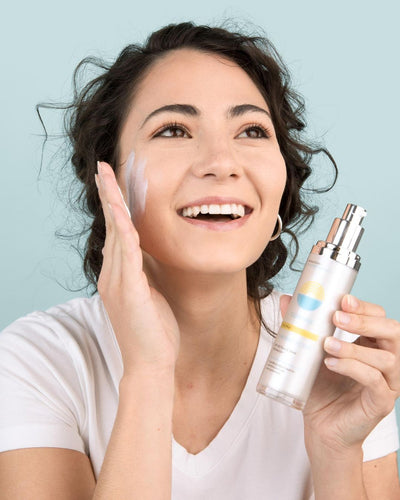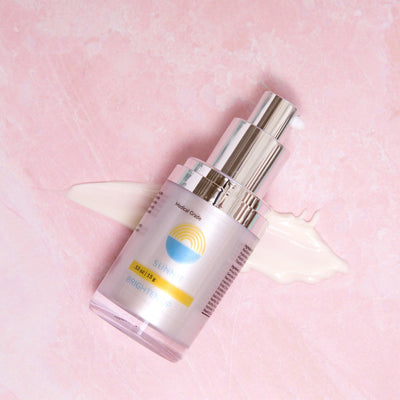Overview
For those of us who care about our daily and nightly skin routine, it can be hard to find the best products for our needs. There are hundreds of moisturizers, cleansers, and eye serums on the market. Eye creams are no different. We see celebrities advertising luxury skincare products and bloggers marketing affordable products, but more often than not the best option is a medical-grade product.
Finding a beneficial eye cream can be a process, but it is worth it in the long run. The right eye cream can help reduce dark circles and crow’s feet, prevent common signs of aging, even your skin tone, and increase your skin’s elasticity. There are plenty of options available today that promise to fix these skin problems, but not all of them follow through. This is where medical-grade eye creams come in handy.
In this article, we’ll explain what you can expect from a medical eye cream. We’ll tell you the difference between over-the-counter eye cream and medical-grade eye cream, as well as the benefits of using the latter. We’ll also explain how different skin types will affect the best eye cream for you, and provide some popular types of medical-grade eye creams.
What is medical-grade eye cream?
Medical-grade eye cream is a product clinically proven to provide the results it guarantees. It contains prescription-strength ingredients that only physicians are allowed to sell. A medical-grade eye cream will not be available on the shelf in the skincare section of your local department store.
Eye cream is used to target the sensitive skin around your eyes. It tackles specific conditions such as dark circles, dry/itchy skin, and wrinkles.
What is the difference between a moisturizer and an eye cream?
A moisturizer is used on your entire face, while eye cream is only used under and around your eyes. Moisturizers often contain different chemicals that are not safe to use close to your eyes. Eye creams have special formulas that make them safe to use around your eyes.
Eye creams also have stronger ingredients than moisturizers so they can work more effectively in a smaller area. As mentioned earlier, eye cream is used for conditions that occur specifically around your eyes, like puffiness or redness.
Medical-grade moisturizers and eye creams are available to purchase, but they will not perform the same. Each product is geared towards different results and must be used as instructed.
How often should you use eye cream?
You only have to apply eye cream once every 12 hours. When you apply it during the day is completely up to you. The most common schedule for skincare routines is a morning ritual and a nightly ritual. Some eye creams recommend using them overnight for the best results. Most eye creams can be used at any time of the day.
What does medical-grade eye cream replace?
A medical-grade eye cream replaces an over-the-counter eye cream you’d find in your local makeup or department store. A single medical-grade eye cream could replace multiple over-the-counter products depending on the ingredients used!
How does it differ from OTC eye creams?
There are a few differences between medical-grade eye creams and OTC eye creams. The first is the level of testing each product goes through. Medical-grade skincare undergoes extensive testing to ensure it’s safe to use on human skin and effective. Over-the-counter products do not have to go through the same intense testing.
Medical-grade eye creams also have a higher concentration of active ingredients to make them more effective. These ingredients are only approved after they have gone through the rigorous testing mentioned above. In contrast, over-the-counter products have a smaller concentration and are less effective.
Medical-grade eye creams are more effective because they can penetrate deeper into the skin to tackle the root of the problem as well. Over-the-counter products do not have this component and can only treat surface-level issues.
What are the key benefits of medical-grade eye creams?
If you use medical-grade eye creams, you will see results much quicker than if you use over-the-counter products. These results don’t come with any damage to your skin either, as some over-the-counter brands can.
Medical-grade eye creams are a long-term investment. Once you’re able to lighten dark circles or tighten wrinkles, you’ll be able to preserve your healthy skin in the long run. Plus, because of the higher quality ingredients in medical-grade eye creams, their longer shelf life means you won’t have to replace empty bottles or jars as often.
What do different skin types need to consider before an eye cream?
Your skin type will be a factor in determining which eye cream is best for you. For example, if you have dry skin around your eyes, you’ll want to find an eye cream that moisturizes. On the other hand, if you have oily skin, a moisturizing eye cream will not absorb as well. You’ll want to find a lighter eye cream to avoid product buildup around your eyes.
Eye creams are already made with sensitive skin in mind, but there are still plenty of allergen-free options out there to ensure no irritation on your skin.
Popular Types of Medical-Grade Eye Creams
There are numerous medical-grade eye creams available today, so we’ve formed a list of the most popular options depending on what ailment you want to focus on.
Sunnie
Sunnie is a medical-grade skin care provider that offers an eye cream tackling all of the common conditions surrounding your eyes. Our Eye Lifting Cream reduces the appearance of dark circles, puffiness, and wrinkles. It contains powerful peptides and vitamins. These ingredients work together to strengthen capillaries, encourage collagen growth, and increase circulation. All of this results in a brighter look that leaves you feeling rejuvenated and refreshed.
Neocutis Lumiere
Neocutis Lumiere has a fantastic illuminating eye cream for brightening the under-eye area. The formula includes glycyrrhetinic acid, which helps lighten the appearance of under-eye darkness. It also contains caffeine to minimize puffiness!
Skinceuticals
One of the biggest factors of aged-looking skin is sun exposure. Skinceuticals has a Physical Eye UV Defense cream that protects the sensitive skin around your eyes from extreme sun damage. It can be used on all skin types and has a non-migrating formula to prevent it from running into your eyes.
Alastin’s
If you’re focused on removing the appearance of fine lines from your eye area, check out Alastin’s Restorative Eye Treatment with TriHex Technology. This product improves the texture around the eyes by removing old collagen and elastin. This makes room for new and healthy collagen/elastin to shine through!
Skinmedica
Puffy under-eyes are one of the most common conditions eye creams tackle. Skinmedica’s TNS Eye Repair is more than qualified to reduce puffiness while brightening and hydrating the skin. Its formula contains retinol, hyaluronic acid, and retinyl palmitate to keep your under eyes happy and healthy.
Jan Marini
Even after a week of feeling well-rested, eye bags don’t seem to go away. Jan Marini’s Luminate Eye Gel can help you eliminate those pesky dark circles. It uses a synthetic active molecule called Chromabright to regulate skin pigmentation.
Where can you find medical-grade eye creams?
As we’ve mentioned, you can’t find medical-grade eye creams in your local drugstore. Before choosing a new eye cream for your skin care regiment, it’s important to talk to your dermatologist first and see what they recommend.
Once you and your dermatologist have decided on an eye cream, you can find nearly any product online. Some brands only sell through their website, whereas others sell through third-party retailers like Amazon.
How much does medical-grade eye cream cost?
The price varies, but it is more expensive than over-the-counter options. Remember, you’re getting better quality ingredients and better results overall!
The average medical-grade eye cream costs between $100 to $200. Keep in mind that these products last much longer than over-the-counter products, and a little goes a long way when using them.
Conclusion
Medical-grade eye cream is a fantastic investment to consider if you want to step up your skincare game. The area around your eyes is more susceptible to signs of aging like wrinkles and fine lines. These medical-grade products can rewind damage from the sun, brighten dark spots, protect delicate skin, and keep your skin looking rejuvenated.
You also want to ensure you’re using the best ingredients for the area around your eyes because they are so sensitive. Medical-grade eye creams take this into account and do not create any lasting damage.
If you’re looking for more ways to level up your skincare routine, consider a medical-grade facial. This facial is a wonderful way to reset your skin. It gives long-lasting results and targets a multitude of skin problems and concerns.
A medical-grade facial can give you prolonged tightness and brightness, and smoother skin. Just like medical-grade eye cream, a medical-grade facial goes deeper into your skin than standard products. The medically-approved ingredients are why you see better and longer lasting results.
Because medical-grade products have highly concentrated ingredients, it is imperative to consult your dermatologist or doctor before adding them into your routine— especially for those of us with skin concerns. Remember, there are multiple options out there to choose from, but this investment will be more than worth your while. Take care of your skin in a long-lasting and healthy way!




